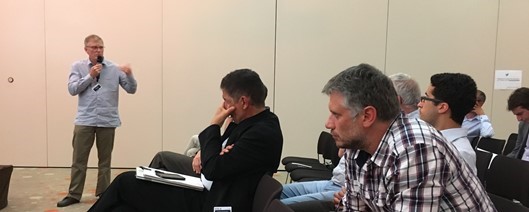

The role of MES as support for Smart Manufacturing was the theme for the 10th « Assises du MES » (MES forum) organized by the « Club MES » in Paris, June 1st, 2017. The underlying thinking is that because customized and personalized manufacturing is gradually becoming more important, Smart Manufacturing approaches become more critical to manage the faster design iterations, smaller batches and work orders, and more frequent changeovers. These can only be built upon well-designed manufacturing operations and data models, interfaced with and synchronized with the right frequency and granularity with ERP, PLM, EAM, Quality/LIMS and APS. The goal, of course, is to provide the right information to operators and supervisors when and where they need it. MES/MOM applications are typically well-suited to provide this, whether they are single applications, a set of collaborating services, on-premise or (partially) in the cloud.
The “Club MES” is composed of vendors, consultants and system integrators active in the French-speaking part of Europe (Belgium, France and Switzerland).
The forum opened with a panel discussion that focused on energy and human resource management. I represented ARC Advisory Group on the panel, which discussed current practices and compared these with new ones that have come to our attention via Smart Manufacturing and “Usine du Futur”. The panel suggested that energy usage must be measured by product and by line, to be benchmarked and improved using ISO 50001 (like) approaches. New technologies such as virtual reality, knowledge capture, and on-line instructions can help operators apply new ways of working. Participative approaches to change can create engagement for change initiatives and improve productivity.
Many users shared their experiences in several parallel tracks. Educational presentations on related topics completed the program. These included adapting lean production methods, organizational models, MES for personalized production, and how to combine IIoT with MES. A quick poll in the room revealed that, out of 100 industry participants, one company was implementing a manufacturing IIoT solution and three had plans to do so. This seems very low compared to the US or Germany and it would be interesting to understand the drivers of the low level of adoption in France.
To help participants in their efforts, two Club MES members had prepared educational presentations on interactive screens in the exhibition area on the topics of planning, the digital thread, performance management and analytics, and collaborative management. These will be downloadable from the Club MES website.
ARC’s overall impression from the testimonials was that a multitude of small, agile MES tools that address variety of very specific applications are available to the local market from smaller companies. These smaller companies seem to be able to fulfil these requirements at a reasonable cost, and outcompete many large players. More details on these testimonials can be found on Linked-In.
The forum ended with an open plenary discussion of questions that participants had tweeted to the organizers. The discussion is described in the Linked-In article cited above.

Open Discussion Forum

